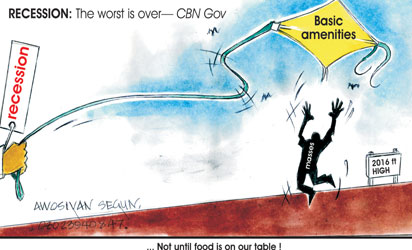Economy
Economy Sinks Deeper Into Recession, As GDP Drops By 2.24%
Goods and services produced in Nigeria between July and September 2016 have dropped lower as the nation grapples with economic slow down.
Companies and other economic agents in the country are producing far below their capacities as Nigeria’s economic slump deepened with oil production falling and factory output hard hit by shortage of foreign exchange.
Data released yesterday by the National Bureau of Statistics, signed by its Director-General, Dr. Yale, showed that the value of goods and services produced in Nigeria GDP, in the third quarter of 2016 contracted by 2.2 per cent in the three months through September from a year earlier, after shrinking 2.1 percent in the second quarter.
Government revenue has also plunged and foreign currency has become scarcer with the decline of oil prices, the country’s main export, since mid-2014, and production fell as militants in the Niger Delta blew up pipelines.
Crude production fell for the fourth consecutive quarter to 1.63 million barrels per day, from 1.69 million barrels in the three months through June, the statistics office said.
The oil industry, the report said, contracted by 22 percent from a year earlier. The non-oil sector, which includes manufacturing, banking and agriculture, expanded 0.03 percent. Factory output contracted 4.4 percent, the third consecutive quarter of decline, and construction shrank 6.1 percent, the fifth straight quarterly contraction.
‘’Manufacturing was affected by the foreign-exchange volatility and depreciation of the naira. We saw significant injection in construction, but there is a time lag between when something is implemented and when you see the impact, that is why we did not see the impact in the third quarter,” said Damilola Akinbami, an analyst at Financial Derivatives Co. in Lagos.
The slump in oil and shortages of foreign currency and power could cause the economy to shrink 1.7 percent this year, according to the International Monetary Fund.
That would be Nigeria’s first full-year contraction since 1991, according to data from the IMF.
Federal Government and other policy makers have assured Nigerians that the worst of the recession was over.
Governor of the Central Bank of Nigeria, CBN, Mr. Godwin Emefiele, in October, assured the public that the economic recession would soon be over, given the strategic measures being put in place by the monetary and fiscal authorities to turn the economy around.
Speaking in Lagos during an interactive session with journalists, Emefiele emphatically stated that the “worst is over”, adding that the Nigerian economy was already on the path of recovery.
The governor equally reiterated his call for the Federal Government to partially sell some of its oil joint venture assets, saying the proceeds raised from the sale would go a long way in boosting Nigeria’s foreign reserves and reflating the economy through infrastructure projects.
Emefiele also expressed optimism that the liberalisation of the foreign exchange (FX) market was starting to pay off, revealing that the country had recorded $1 billion capital. The Senate, two weeks ago, rejected the government’s spending plan for the next three years because the proposals, which were meant to boost the economy, lacked details. Lawmakers also rejected President Muhammadu Buhari’s plan to borrow $30 billion abroad through 2018 on the same grounds.
NBS report said: “In the third quarter of 2016, the nation’s Gross Domestic Product (GDP) contracted by -2.24 per cent (year-on-year) in real terms. This was lower by 0.18 per cent points from growth recorded in the preceding quarter and also lower by 5.08 per cent points from growth recorded in the corresponding quarter of 2015. Quarter on quarter (unadjusted for seasonality), real GDP increased by 8.99 per cent
“During the quarter, aggregate GDP stood at N26.55895283 trillion (in nominal terms) at basic prices, compared to the third quarter 2015 value of N24.31363694 trillion. Nominal GDP grew by 9.23 per cent. This growth was higher relative to growth recorded in the third quarter of 2015 by 3.22 per cent points. The Nigerian economy can be more clearly understood according to the oil and non-oil sector classifications.”
The report said: “During the period under review, oil production according to NNPC, averaged at 1.63 million barrels per day (mbpd), lower from production in second quarter of 2016. Oil production was also lower relative to the corresponding quarter in 2015 by 0.54 million barrels per day when output was recorded at 2.17mbpd.
“As a result, real growth of the oil sector slowed by –22.01 per cent (year-on-year) in third quarter of 2016. This represents a decline relative to growth recorded in same quarter of 2015 at 1.06 per cent. Growth declined by 23.07 per cent points and 4.54 per cent relative to growth in third quarter of 2015 and second quarter of 2016 respectively. Quarter-on-Quarter, growth was 8.07 per cent.
As a share of the economy, the Oil sector contributed 8.19 per cent of total real GDP, down from figures recorded in the corresponding period of 2015 and the preceding quarter of 2016 recorded at 10.27% and 8.26% respectively.
“Growth in the Non-oil sector was largely driven by the activities of Agriculture (Crop Production), Information & Communication and Other Services.”
Follow us on social media:-

 Celebrity Gossip & Gist2 days ago
Celebrity Gossip & Gist2 days ago“The money wey dem pay me don expire” – Moment Burna Boy stops his performance at the Oando PLC end of the year party (Video)
-

 Economy2 days ago
Economy2 days agoGoods worth millions of naira destroyed as fire guts spare parts market in Ibadan
-

 Celebrity Gossip & Gist22 hours ago
Celebrity Gossip & Gist22 hours agoMoment stage collapses on Odumodublvck during concert performance (Video)
-

 Economy21 hours ago
Economy21 hours agoPresident Tinubu cancels Lagos engagements in honor of food stampede victims





